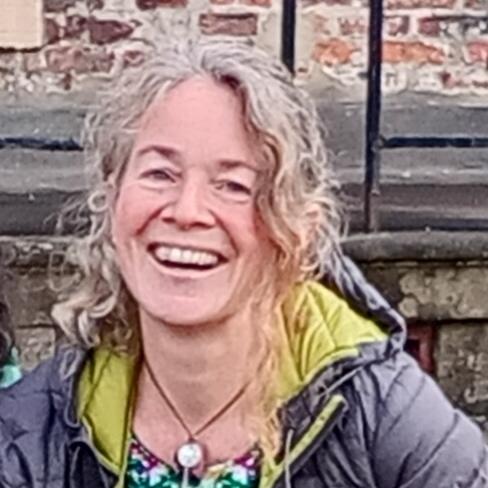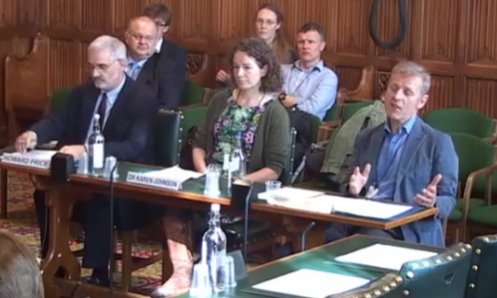Staff profile
Professor Karen Johnson
Professor

| Affiliation | Telephone |
|---|---|
| Professor in the Department of Engineering | +44 (0) 191 33 42441 |
| Fellow of the Wolfson Research Institute for Health and Wellbeing | +44 (0) 191 33 42441 |
Biography
Karen Johnson is a Professor in Environmental Engineering at Durham University. Having trained as a hydrogeologist, graduating with an MSc from University College London in 1995, she worked in the water industry (General Utilities/consultancy) for 3 years. She returned to academia in 1998 and completed her PhD in mine water treatment with Professor Paul Younger in 2001 at Newcastle University (NU). She worked at Newcastle University as a Research Associate until coming to Durham University (DU) in 2005.
Karen’s research has a strong emphasis on using ‘wastes’ as resources. To date, much of her research has focussed on the passive treatment of contaminated waters and soils using clean ‘wastes’ which were previously destined for landfill. Karen has a track record of multi-disciplinary projects collaborating both with industry, regulatory authorities, policy-makers, science and social science departments.
In 2016, Prof Johnson gave oral evidence to the Government's Environmental Audit Committee's Inquiry into Soil Health. She stated that urban soils are currently unprotected and that engineers should lead the way in the sustainable management of urban soils since soils have an important role to play both in climate change adaptation and climate change mitigation http://www.parliamentlive.tv/Event/Index/f77d63b0-bc6e-425b-aa47-ba63be60be99 …pic.twitter.com/wNU6gaXp5Y

Her more recent work has focussed on breaking the link between land insecurity and poverty in Africa (Sudan, Zimbabwe, Ghana and South Africa)
She is also passionate about raising public awareness of the importance of soil having worked with Pixelhouse Media to produce animations championing soil eg raising awareness of the link between soil degradation and flooding in conjunction with Hotspur Primary School and also about community regeneration of brownfield land ('A nation that destroys its soil destroys itself')
As PI, she has held or is currently holding funding for a number of recent projects:
EPSRC, £112K, 2003-5, First Grant GR/S49155/01, £112K (plus £15K industrial support from the Coal Authority), “The use of recycled construction/demolition and industrial waste as a substrate in a novel manganese removal passive treatment system” (project rated ‘tending to internationally leading’). Co-is included Prof Manning and Dr Singleton from Newcastle University
EPSRC, £48K (plus £12K), 2003-6. CASE for New Academics (Industrial support from Tarmac Ltd). Novel Uses for Basic Oxygen Steel Slag in Environmental Engineering Applications.
Industrial funding totaling, £112K, 2005-2011 (from BHP Billiton Ltd, Assmang Ltd and Scott Wilson Ltd to help support three EPSRC PhD students, two at Durham and one PhD at University of Stellenbosch in SA) to investigate the use of ‘wastes’ to treat contaminated land with Tony Hutchings (Head of Contaminated Land Team) from Forest Research (FR) as a co-supervisor;
EPSRC, £120K, 2005-8 and 2008-11, Doctoral Training Account money from SoE, DU for the two aforementioned DU PhD students;
Royal Society, £14K, 2006-7, New Investigators Grant, - £14K, “The use of manganese oxide as contaminated land remediation products” in conjunction with Dr Gonçlaves at University of Beira, Portugal;
Royal Society, £4K, 2008-9, Visiting Academic Grant, “The use of ‘wastes’ to treat land” for Dr Hu Liming from Tsinghua University, China, February – March 2008, another visit to be arranged for June 2009;
EPSRC, £450K, 2008-2011, (EP/E0441/17, joint with Newcastle University, DU share £350K),– “The use of manganese oxide as contaminated land remediation products”. Co-is include Dr Gray and Dr Davenport from Newcastle University
NESTA, £4K, 2008, Crucible award - Four training weekends to develop innovation and interdisciplinarity for Early Career Researchers
STFC, £100K 2012-2013, (10 days total Diamond Synchotron time) for Pb and As bonding in Mn oxides
EPSRC, £1055K, 2009-15, (EP/G028958/1, Challenging Engineering Scheme) – ROBUST http://www.robustdurham.org.uk – Regeneration Of Brownfield Using Sustainable Technologies. Co-I includes Dr Bambra from Durham University.
SSRL, £100K, 2014-2016 Stanford Synchotron Research Laboratory funding (10 days beamline time) looking at carbon stabilization in minerals
2014-2015 Leverhulme Artist in Residency, £15K for Stephen Livingstone artist
2016-2017 DU Enhancing Student Learning Award, £9K, Embedding Sustainable Development into General Engineering Curricula to enhance diversity.
Karen has developed fruitful collaborations with overseas academics (all Visiting Academics on current/past grants), for example in Zimbabwe - where she has established links with Professors Florence MtambaNgenwe and Paul Mapfumo at University of Zimbabwe, in South Africa with Dr Clarke at the University of Stellenbosch and in the US with Prof Tebo at Oregon University of Health and Science. She has also been a member of the EPSRC College from 2006.
Currently, Karen teaches “Polluted Environments and Sustainability” and “Materials” to third year MEng, MSc and BEng Engineering students. Student projects in are frequently linked with industry including Tarmac http://www.tarmac.co.uk NWL http://www.nwl.co.uk/ and Terrainfirma Ltd http://www.terrainfirma.co.uk.
Professor Johnson is also the Director of Research for her department and is keen to raise the profile of women in engineering (https://www.youtube.com/watch?v=1Q40dD0pzUk)
Esteem Indicators
- 2011: Philip Leverhulme Prize in Engineering:
- 2008: EPSRC Challenging Engineering Grant:
- 2008: NESTA Crucible Award:
- 2006: External Examiner: External Examiner for PhD thesis (Birmingham) and for MPhil thesis (Aberdeen).
- 2006: Collaborative research: Industrial support for research from International companies, Tarmac Ltd, BHP Billiton Ltd and Assmang Ltd totalling £126K. Relationship has been for 4, 2 and 1 years respectively.
- 2006: Invited Lecturer: Invited lecturer at Newcastle University and at Herriot Watt University
- 2006: Invited member of UKRC Networks: Invited member of EPSRC Industrial Symbiosis Network and of NERC Fluorescence Spectrophotometry Network
- 2006: Member of EPSRC College: Invited member of the EPSRC College from 2006-9
Publications
Conference Paper
Journal Article
- Gwandu, T., Lukashe, N., Rurinda, J., Stone, W., Chivasa, S., Clarke, C., …Johnson, K. (2023). Coapplication of water treatment residual and compost for increased phosphorus availability in arable sandy soils. Journal of Sustainable Agriculture and Environment, 2(1), 68-81. https://doi.org/10.1002/sae2.12039
- Johnson, K. L., Stone, W., Dominelli, L., Chivasa, S., Clarke, C. E., Gwandu, T., & Appleby, J. (2023). Boosting soil literacy in schools can help improve understanding of soil/human health linkages in Generation Z. Frontiers in Environmental Science, 10, https://doi.org/10.3389/fenvs.2022.1028839
- Gwandu, T., Blake, L., Nezomba, H., Rurinda, J., Chivasa, S., Mtambanengwe, F., & Johnson, K. (2022). Waste to resource: use of water treatment residual for increased maize productivity and micronutrient content. Environmental Geochemistry and Health, 44(10), 3359-3376. https://doi.org/10.1007/s10653-021-01100-z
- Johnson, K. L., Gray, N. D., Stone, W., Kelly, B. F., Fitzsimons, M. F., Clarke, C., …Gwandu, T. (2022). A nation that rebuilds its soils rebuilds itself- an engineer's perspective. Soil security, 7, Article 100060. https://doi.org/10.1016/j.soisec.2022.100060
- Kerr, H. C., Johnson, K. L., & Toll, D. G. (2022). Reusing Fe water treatment residual as a soil amendment to improve physical function and flood resilience. SOIL, 8(1), 283-295. https://doi.org/10.5194/soil-8-283-2022
- Stone, W., Lukashe, N. S., Blake, L. I., Gwandu, T., Hardie, A. G., Quinton, J., …Clarke, C. E. (2021). The microbiology of rebuilding soils with water treatment residual co‐amendments: Risks and benefits. Journal of Environmental Quality, 50(6), 1381-1394. https://doi.org/10.1002/jeq2.20286
- Findlay, N. C., Peacock, C. L., Hudson-Edwards, K. A., & Johnson, K. L. (2021). Characteristics and Mechanisms of Pb(II) Sorption onto Fe-rich waste Water Treatment Residue (WTR): A potential sustainable Pb immobilisation technology for soils. Journal of Hazardous Materials, 402, Article 123433. https://doi.org/10.1016/j.jhazmat.2020.123433
- Crilly, M., Vemury, C. M., Humphrey, R., Rodriguez, S., Crosbie, T., Johnson, K., …Heidrich, O. (2020). Common Language of Sustainability for Built Environment Professionals—The Quintuple Helix Model for Higher Education. Energies, 13(22), Article 5860. https://doi.org/10.3390/en13225860
- Clarke, C. E., Stone, W., Hardie, A. G., Quinton, J. N., Blake, L. I., & Johnson, K. L. (2019). Better Together: Water Treatment Residual and Poor-Quality Compost Improves Sandy Soil Fertility. Journal of Environmental Quality, 48(6), 1781-1788. https://doi.org/10.2134/jeq2019.03.0147
- Johnson, K., McCann, C., Wilkinson, J., Jones, M., Tebo, B., West, M., …Hudson-Edwards, K. (2018). Dissolved Mn(III) in Water Treatment Works: Prevalence and Significance. Water Research, 140, 181-190. https://doi.org/10.1016/j.watres.2018.04.038
- McCann, C. M., Peacock, C. L., Hudson-Edwards, K. A., Shrimpton, T., Gray, N. D., & Johnson, K. L. (2018). In situ arsenic oxidation and sorption by a Fe-Mn binary oxide waste in soil. Journal of Hazardous Materials, 342, 724-731. https://doi.org/10.1016/j.jhazmat.2017.08.066
- Finlay, N., Johnson, K., & Worrall, F. (2016). The role of water treatment abstraction in the flux and greenhouse gas emissions from organic carbon and nitrogen within UK rivers. Water Resources Research, 52(10), 8190-8201. https://doi.org/10.1002/2016wr019362
- Johnson, K. (2016). Soil Remediation: Engage Engineers in Soil Management. Nature, 532(7597), https://doi.org/10.1038/532037b
- McCann, C., Gray, N., Tourney, J., Davenport, R., Wade, M., Finlay, N., …Johnson, K. (2015). Remediation of a historically Pb contaminated soil using a model natural Mn oxide waste. Chemosphere, 138, 211-217. https://doi.org/10.1016/j.chemosphere.2015.05.054
- Johnson, K., Purvis, G., Lopez-Capel, E., Peacock, C., Gray, N., Wagner, T., …Greenwell, C. (2015). Towards a Mechanistic Understanding of Carbon Stabilization in Manganese Oxides. Nature Communications, 6, Article 7628. https://doi.org/10.1038/ncomms8628
- Bambra, C., Cairns, J., Kasim, A., Smith, J., Robertson, S., Copeland, A., & Johnson, K. (2015). This divided land: An examination of regional inequalities in exposure to brownfield land and the association with morbidity and mortality in England. Health & Place, 34, 257-269. https://doi.org/10.1016/j.healthplace.2015.05.010
- Greathouse, J., Johnson, K., & Greenwell, H. (2014). Interaction of Natural Organic Matter with Layered Minerals: Recent Developments in Computational Methods at the Nanoscale. Minerals, 4(2), 519-540. https://doi.org/10.3390/min4020519
- Bambra, C., Robertson, S., Kasim, A., Smith, J., Cairns-Nagi, J., Copeland, A., …Johnson, K. (2014). Healthy land? An examination of the area-level association between brownfield land and morbidity and mortality in England. Environment and Planning A, 46(2), 433-454. https://doi.org/10.1068/a46105
- Clarke, C., Kielar, F., & Johnson, K. (2013). The oxidation of acid azo dye AY 36 by a manganese oxide containing mine waste. Journal of Hazardous Materials, 246-247, https://doi.org/10.1016/j.jhazmat.2012.12.018
- Clarke, C., Tourney, J., & Johnson, K. (2012). Oxidation of anthracene using waste Mn oxide minerals: the importance of wetting and drying sequences. Journal of Hazardous Materials, 205-206, 126-130. https://doi.org/10.1016/j.jhazmat.2011.12.047
- Clarke, C. E., & Johnson, K. L. (2010). Oxidative breakdown of acid orange 7 by a manganese oxide containing mine waste: Insight into sorption, kinetics and reaction dynamics. Applied Catalysis B: Environmental, 101(1-2), 13-20. https://doi.org/10.1016/j.apcatb.2010.08.020
- Clarke, C., Kielar, F., Talbot, H., & Johnson, K. (2010). Oxidative Decolorization of Acid Azo Dyes by a Mn Oxide Containing Waste. Environmental Science and Technology, 44(3), 1116-1122. https://doi.org/10.1021/es902305e
- Bowden, L., Jarvis, A., Younger, P., & Johnson, K. (2009). Phosphorus removal from waste waters using basic oxygen slag. Environmental Science and Technology, 43(7), 2476-2481. https://doi.org/10.1021/es801626d
- Bamforth, S., Manning, D., Singleton, I., Younger, P., & Johnson, K. (2006). Manganese removal from mine waters - investigating the occurrence and importance of manganese carbonates. Applied Geochemistry, 21(8), 1274-1287. https://doi.org/10.1016/j.apgeochem.2006.06.004
- Johnson, K., & Younger, P. (2006). The co-treatment of sewage and mine waters in aerobic wetlands. Engineering Geology, 85(1-2), 53-61. https://doi.org/10.1016/j.enggeo.2005.09.026
- Johnson, K., & Younger, P. (2005). Rapid manganese removal from mine waters using an aerated packed-bed bioreactor. Journal of Environmental Quality, 34(3), 987-993. https://doi.org/10.2134/jeq2004.0300
- Johnson, K., Baker, A., & Manning, D. (2005). Passive treatment of mn-rich mine water : using fluorescence to observe microbiological activity. Geomicrobiology Journal, 22(3-4), 141-149. https://doi.org/10.1080/01490450590945979
- Johnson, K., & Younger, P. (2003). The importance of aeration in passive treatment schemes for manganese removal
- Johnson, K., & Younger, P. (2002). Hydrogeological and Geochemical Consequences of the Abandonment of Frazer’s Grove Carbonate Hosted Pb/Zn Fluorspar Mine, North Pennines, UK
Report

